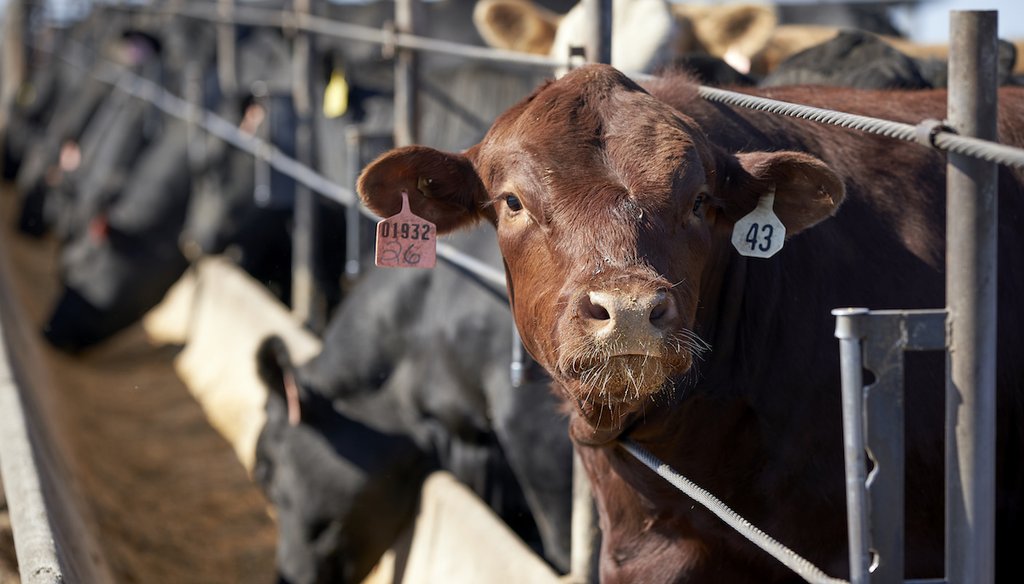

Nuestra única agenda es publicar la verdad para que puedas ser un participante informado en la democracia.
Necesitamos tu ayuda.


Cattle occupy a feedlot in Columbus, Neb., on June 10, 2020. (AP)
MRNA vaccines are not widely used on livestock in the United States, experts said.
Even when given to livestock, mRNA vaccines cannot enter humans’ food supply. The vaccines rapidly disappear after injection, an expert said.
MRNA vaccines for COVID-19 have been given to millions of Americans and have a strong safety record.
A headline shared on Facebook invoked Dr. Robert Malone, a vaccine scientist-turned-anti-vaccine activist, and suggested he said mRNA vaccines are in our food.
Throughout the COVID-19 pandemic, Malone has made false and misleading claims about the virus and the vaccines to protect against it.
The headline, from a site called TruthPress.com, read: "Dr. Malone: MRNA Vaccines Are Being Injected Into Our Food Supply."
The post that shared the headline was flagged as part of Facebook’s efforts to combat false news and misinformation on its News Feed. (Read more about our partnership with Meta, which owns Facebook and Instagram.)
Experts said there is no widespread use of mRNA vaccines in livestock in the United States.
And even in cases in which mRNA vaccines are used in livestock, there is no chance those vaccines could transfer to a person who eats meat from a vaccinated animal, according to the experts.
The vaccines "are not contaminating our food supply," said Melissa Brown, a Northwestern University immunology professor.
We’ve repeatedly debunked claims that vaccines can be transmitted to people by means other than direct injection.
The headline shared on Facebook accompanied an article that started, "This could be one of the most alarming warnings yet from Dr. Malone. He wrote an essay on how mRNA vaccines are being injected into livestock and companion animals. That means, if you consume the vaccinated animal, the mRNA vaccine enters your body."
The essay is a Jan. 11 blog post by Malone, but it doesn’t mention the food supply.
MRNA vaccines help the body produce a viral protein, which triggers the body to produce antibodies to help protect against infection. That’s slightly different from other vaccines, which contain weakened or dead bacteria or virus to trigger an immune response and help prevent infection.
The Pfizer and Moderna vaccines for COVID-19, the most common ones given in the United States during the pandemic, use mRNA technology.
The claim implies that mRNA vaccines are not safe for humans. But more than 666 million doses of COVID-19 vaccine have been given in the U.S., and the shots have a strong safety record, according to the federal Centers for Disease Control and Prevention.
A study published in December estimated that, in a roughly one-year period ended in November 2022, the vaccines prevented 3.2 million deaths in the U.S.
Brown at Northwestern; John Moore, a Cornell University microbiology and immunology professor; and Tulane University professor Robert Garry, whose research specialties include virology, all said there is no widespread injection of mRNA vaccines into livestock.
Research efforts toward developing mRNA vaccines for livestock are in the early stages, Brown said. A study published in February said mRNA vaccines have been used in clinical trials in animals to test their effectiveness against infectious diseases such as rabies.
"These vaccines would be better than the current vaccines that protect animals, less chance of live virus that could infect humans and, in theory, could reduce antibiotic use," Brown said.
The experts added that even when livestock get the vaccines, they cannot transfer to people who eat those animals.
Because of the way mRNA vaccines break down after injection, "there is no chance that a veterinary mRNA vaccine would produce any protein in a person consuming the meat from a vaccinated animal," Garry said.
MRNA vaccines "rapidly disappear after injection, and the components will be gone within a few weeks at most," said Moore. Moreover, he added, even if somehow the components remained in meat, they "would be almost instantly destroyed by the acid and the enzymes in our stomachs."
We rate the claim that mRNA vaccines are being injected into our food supply False.
RELATED: Does Pfizer’s COVID-19 booster increase stroke risk? ‘Very unlikely,’ agencies say
RELATED: Why an analysis of COVID-19 vaccines from Florida’s surgeon general is flawed
RELATED: No, the Food and Drug Administration didn’t say that the Pfizer COVID-19 vaccine causes blood clots
Facebook, post, Jan. 13, 2023
TruthPress.com, "Dr. Malone: MRNA Vaccines Are Being Injected Into Our Food Supply," (archived) Jan. 13, 2023
Substack, "mRNA Vaccines in Livestock and Companion Animals are here now," Jan. 11, 2023
The Commonwealth Fund, "Two Years of U.S. COVID-19 Vaccines Have Prevented Millions of Hospitalizations and Deaths," Dec. 13, 2022
National Library of Medicine, "What are mRNA vaccines and how do they work?", Nov. 21, 2022
PolitiFact, "No, mRNA vaccines aren’t being used on livestock in Australia," Nov. 3, 2022
PolitiFact, "Debunking the anti-vaccine hoax about ‘vaccine shedding,’" May 6, 2021
PolitiFact, "No, there is no evidence that spending time around vaccinated people causes death or disease," April 30, 2021
PolitiFact, "No, women’s cycles and fertility are not affected by being around vaccinated people," April 21, 2021
FactCheck.org, "Meme Spreads Falsehood About Vaccine Transfer Through Eating Meat," July 15, 2021
Email, John Moore, Cornell University professor of microbiology and immunology, Jan. 18, 2023
Email, Tulane University School of Medicine professor Robert Garry, Jan. 18, 2023
Centers for Disease Control and Prevention, "Selected Adverse Events Reported after COVID-19 Vaccination," Jan. 19, 2023
Email, Melissa Brown, Northwestern University Feinberg School of Medicine professor emeritus of microbiology-immunology, Jan. 19, 2023
Viruses, "mRNA Vaccine Development for Emerging Animal and Zoonotic Diseases," Feb. 15, 2022
Email, Steven Roach, safe and healthy food program director at Food Animal Concerns Trust, Jan. 23, 2023
En un mundo de rumores y noticias falsas, ayúdanos a defender los hechos.
